What Are Destructive Key phrases?
Destructive key phrases are phrases or phrases you’ll be able to add to pay-per-click (PPC) campaigns to forestall your advertisements from showing on irrelevant websites or movies. Or in search outcomes when customers seek for these phrases (or intently associated phrases).
For instance, a luxurious shoe retailer working a search marketing campaign would possibly add “low-cost” as a adverse key phrase in Google Advertisements. To forestall their advertisements from showing when folks seek for low-cost footwear.
Destructive key phrase concentrating on may help you to:
- Lower your expenses. Search promoting works on a PPC foundation.Destructive key phrases show you how to keep away from paying for clicks from individuals who aren’t excited by your services or products.
- Enhance your High quality Rating. Destructive key phrases could make your advertisements extra related to your landing pages and enhance your Quality Score (a Google metric that impacts whether or not and the place your advertisements present).
- Enhance conversions. As a result of adverse key phrases show you how to spend your funds extra successfully and earn higher advert placement, you’ll be able to anticipate extra clicks and conversions (e.g., gross sales).
- Shield your model picture. If you happen to don’t use adverse key phrases, there’s an even bigger probability your model will likely be related to phrases or subjects you don’t like (e.g., “low-cost”).
What Are the Destructive Key phrase Match Sorts?
Whenever you add a adverse key phrase to a marketing campaign, it’s worthwhile to select a keyword match type. This determines the scope of queries which are excluded.
Let’s discover the these match sorts by some adverse key phrase examples:
Broad Match Destructive Key phrases
Broad match is the default setting for adverse key phrases in Google Advertisements.
If a search question consists of your entire adverse key phrase phrases in any order, your advert received’t be triggered.
For instance, in case your adverse key phrase is “mountain bikes,” and somebody searches for “bikes mountain,” your advert received’t present. As a result of it incorporates your entire adverse key phrase phrases.
However your advert would possibly show if the search consists of solely a few of your adverse key phrase phrases. Even when the search has phrases which are very near your adverse key phrase.
Utilizing the identical instance, if somebody searches for “mountain bike,” your advert might present. As a result of your adverse key phrase included the “s” in “bikes.”
Right here’s a graphic to assist illustrate:
Phrase Match Destructive Key phrases
With adverse phrase match, your advert won’t present if the search question consists of the precise key phrase phrases within the specified order.
Though the search question can embody further phrases, your advert received’t show so long as it incorporates your entire key phrase phrases in the identical sequence.
For instance, in case your adverse key phrase is “mountain bikes,” and somebody searches for “trek mountain bikes,” your advert received’t present.
Your advert can seem if the order of the key phrase phrases is completely different or if the phrases have an additional character. For instance, if somebody searches for “bikes mountain.”
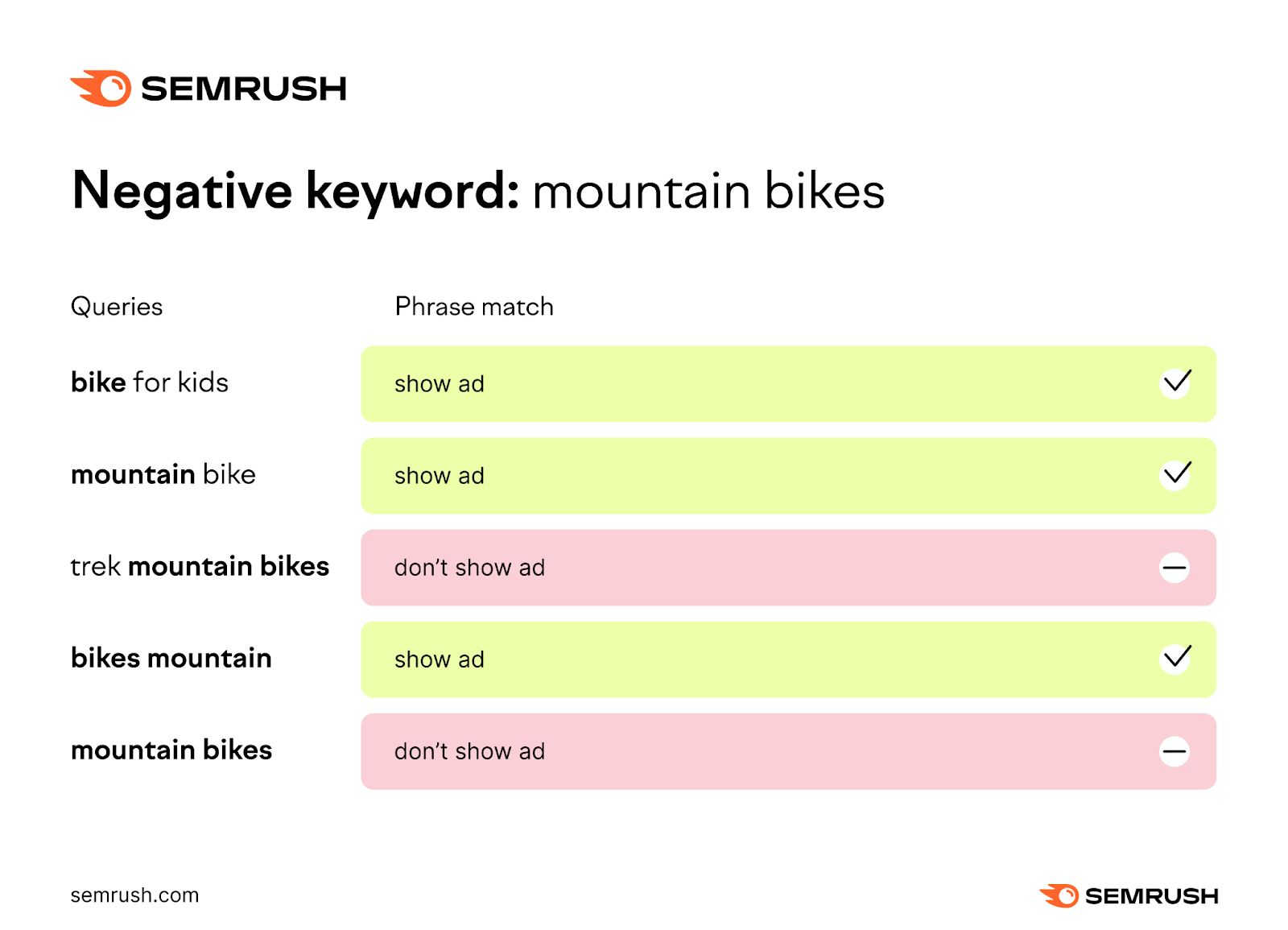
Actual Match Destructive Key phrases
With adverse precise match key phrases, your advert received’t present if the search question exactly matches the key phrase phrases in the very same order—with out further phrases or characters.
In case your adverse key phrase is “mountain bikes,” and somebody searches for “mountain bikes,” your advert received’t present.
But when somebody searches for “bikes mountain” or “mountain bike,” your advert might seem.
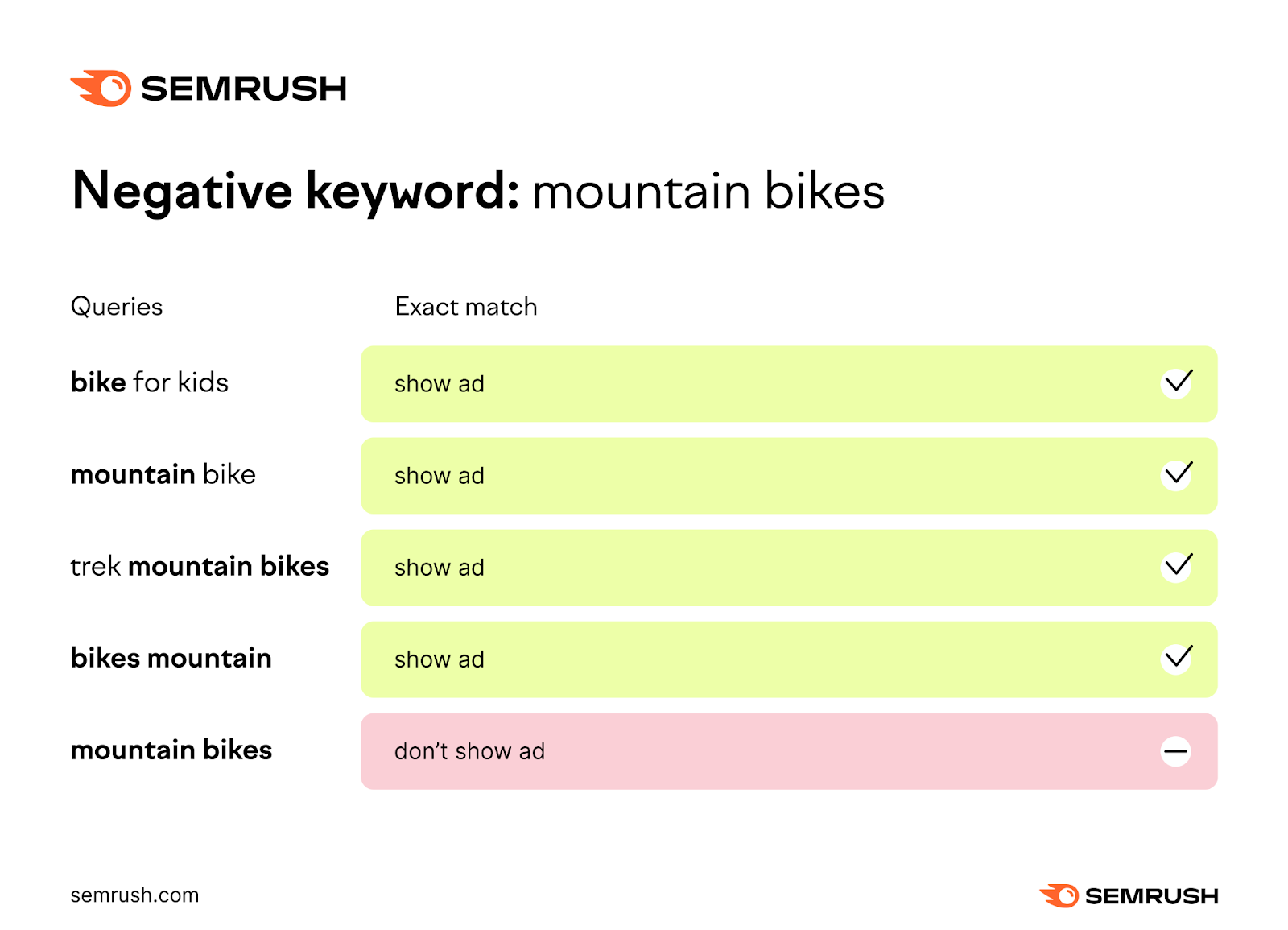
Account-Stage vs. Marketing campaign-Stage vs. Advert Group-Stage Key phrases
Google Advertisements accounts are organized in three ranges: account, campaigns, and advert teams.
Like so:
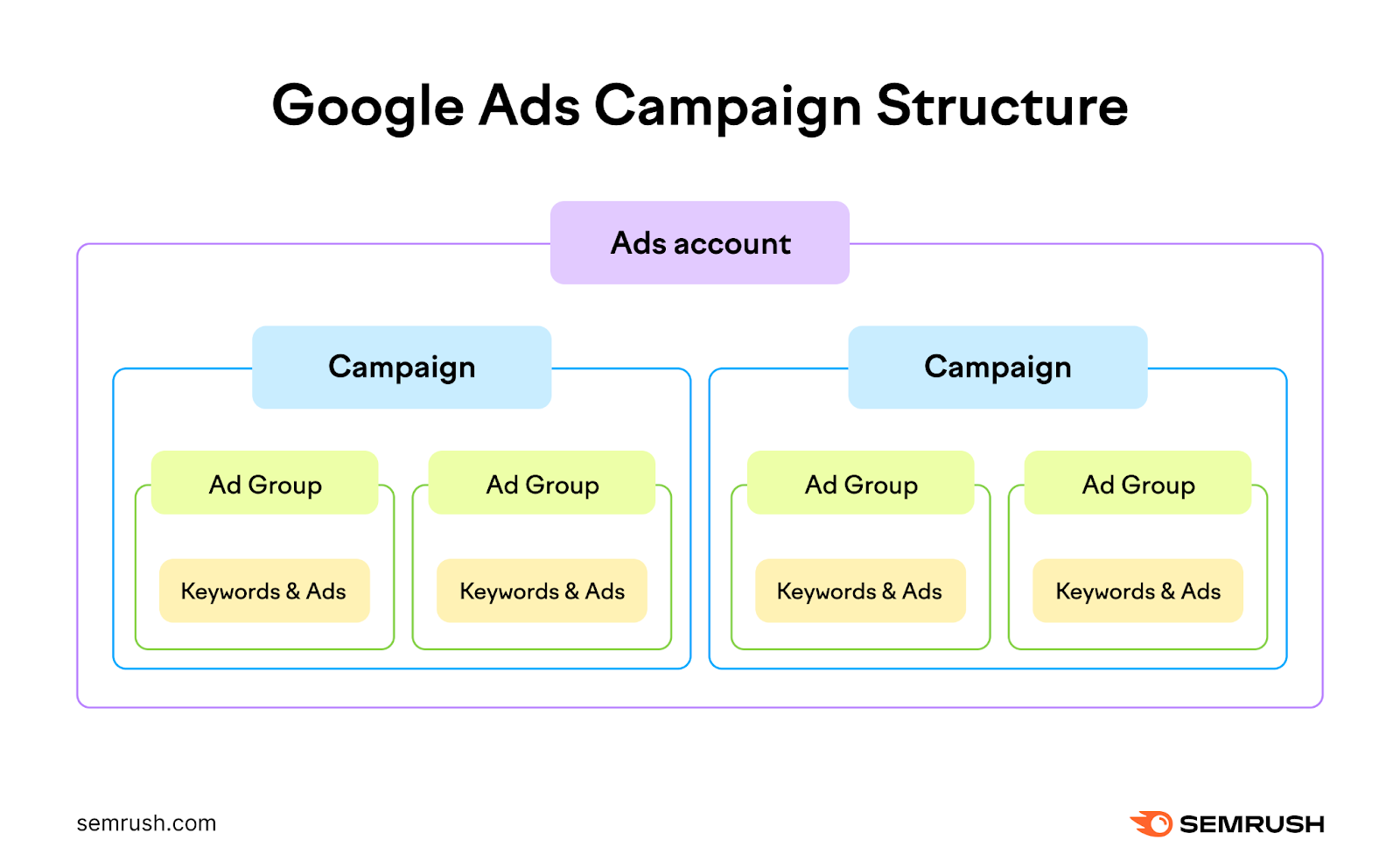
You’ll be able to add adverse key phrases on the account, advert group, and marketing campaign stage.
Account-level adverse key phrases apply to all campaigns inside your account.
As an alternative of including the identical adverse key phrases to every marketing campaign, you’ll be able to handle them on the account stage. To avoid wasting time and scale back the probabilities of human error.
For instance, you’ll be able to create a listing of search phrases you contemplate dangerous in your model. And apply it immediately to all campaigns on the account stage.
Marketing campaign-level adverse key phrases apply to all advertisements inside that marketing campaign.
If you happen to add “free” as a campaign-level adverse key phrase, none of your advertisements in that marketing campaign will seem for searches containing the phrase “free.”
Advert group-level adverse key phrases apply to particular advert teams inside a marketing campaign. To present you extra management over which advertisements present up for which searches.
Let’s say you’re working a vacation shoe marketing campaign. And you’ve got an advert group for “trainers” and one other advert group for “gown footwear.”
You would possibly wish to add “formal” as a adverse key phrase for the “trainers” advert group. And “informal” as a adverse key phrase for the “gown footwear” advert group.
Like so:
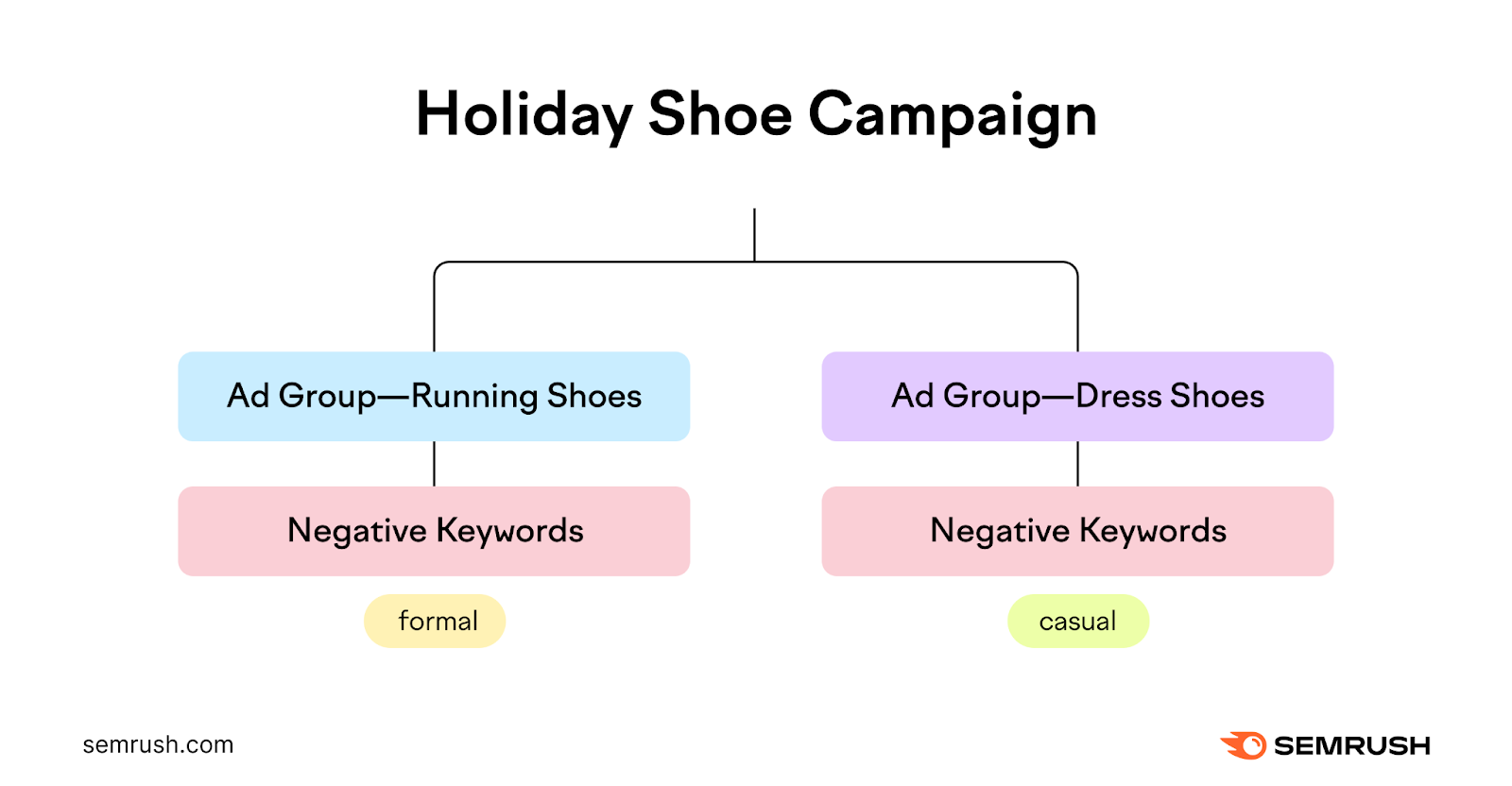
Use campaign-level adverse key phrases for broad phrases which are irrelevant in your complete marketing campaign.
And use advert group-level adverse key phrases for particular phrases which are related to some advert teams however not others.
Additional studying: What Is Google Ads & How Does It Work? A Comprehensive Guide
Methods to Discover Destructive Key phrases
Listed here are 5 methods to search out adverse key phrases in your PPC campaigns:
Do Key phrase Analysis
Begin with some fundamental keyword research utilizing a key phrase analysis software.
This helps you see what persons are trying to find in your area of interest. And uncover 1000’s of key phrase concepts.
Begin by getting into your marketing campaign’s major key phrase into the Keyword Magic Tool. Then, choose your location and click on “Search.”

You’ll get a listing of key phrase concepts primarily based in your seed key phrase. And useful metrics like common month-to-month search quantity, search intent (the rationale for a searcher’s question), price per click on (CPC), and extra.
Like this:
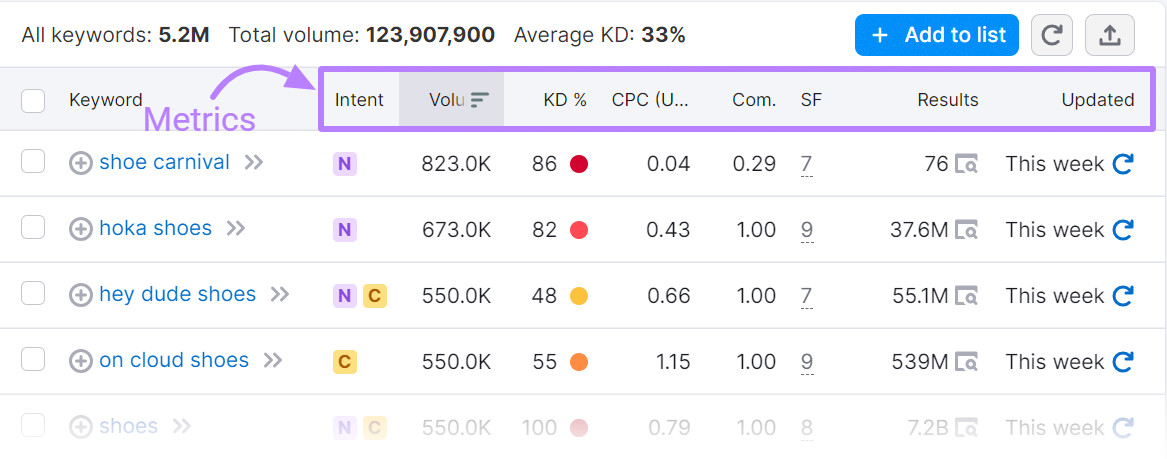
Word all of the key phrases (or components of key phrases) which are irrelevant to your marketing campaign.
For instance, should you personal a premium shoe retailer, you would possibly discover irrelevant search phrases like “low-cost footwear,” “outlet footwear,” or “second hand footwear.”
These are all potential adverse key phrases.
See What Rivals Are Bidding On
Rivals (and oblique opponents) might bid on keywords which are just like yours however not precisely related to your model.
So, their key phrase lists can present good inspiration for adverse key phrases.
You’ll be able to analyze a competitor’s PPC key phrases with Semrush’s Advertising Research software.
Simply enter their area, select your nation, and click on “Search.”

Then, scroll all the way down to the “Paid Search Positions” desk.
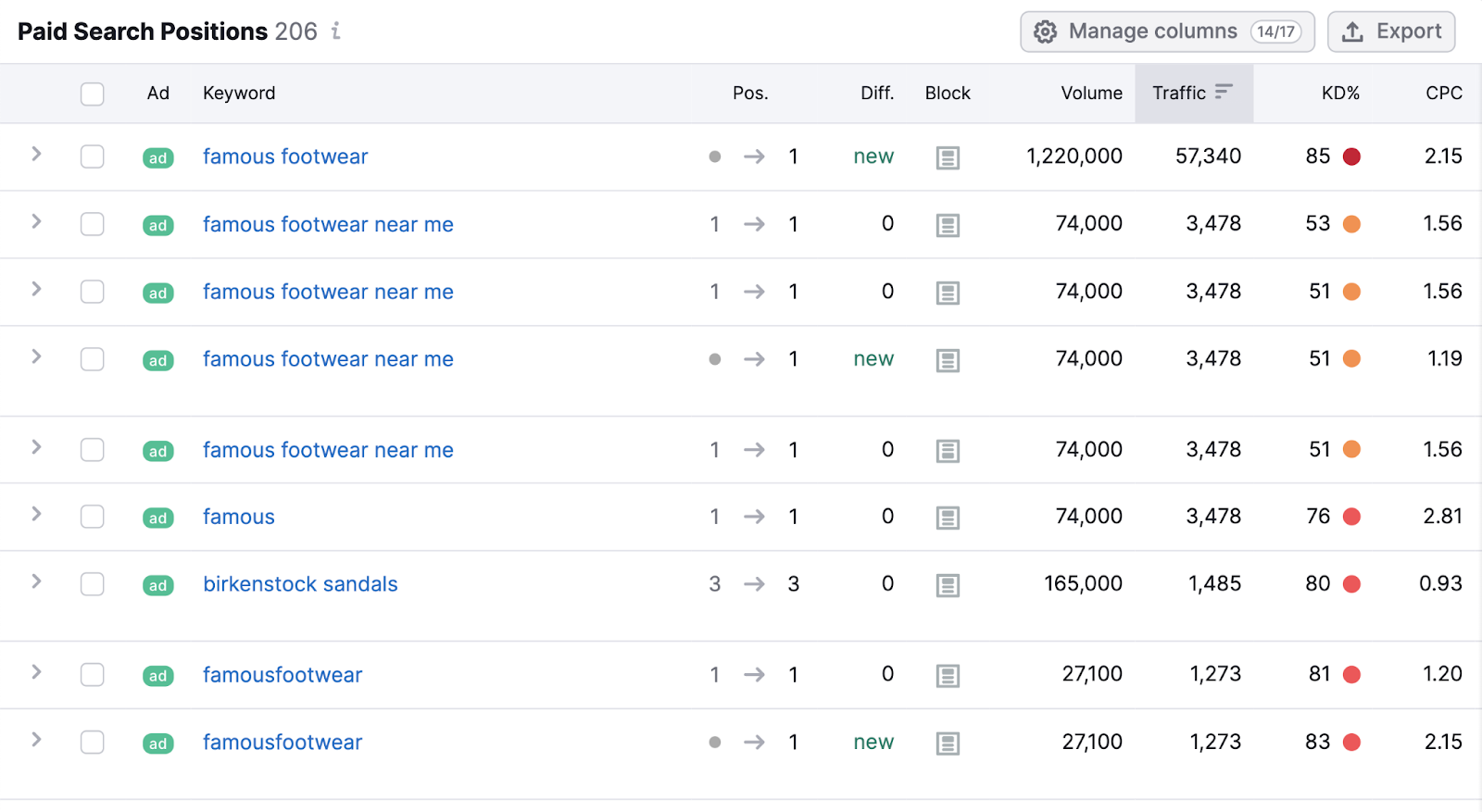
In our instance, we’ve analyzed a reduction shoe retailer.
From these outcomes, a luxurious shoe retailer would possibly select adverse key phrases like “low cost boots” and “youngsters nikes on sale.”
Search Manually on Google
If you happen to don’t wish to use a adverse key phrase software, you’ll be able to search manually on Google.
Merely search a time period associated to your meant advert, then scan the outcomes web page for irrelevant phrases.
For instance, should you promote skilled mountain bikes, seek for “mountain bikes.”
It’s possible you’ll spot irrelevant key phrases reminiscent of “emountain” or “leisure bikes.”
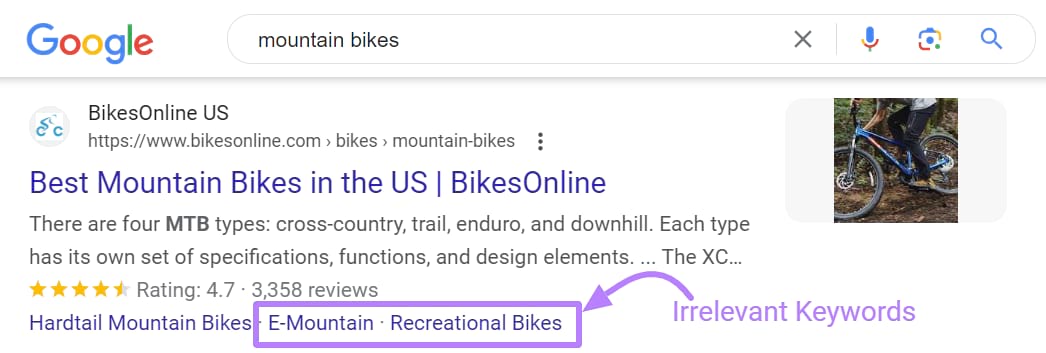
And add any unrelated key phrases to your adverse key phrases checklist.
Google’s autocomplete characteristic may show you how to determine adverse key phrases.
Begin typing your major key phrase to see a drop-down checklist of associated phrases folks seek for:
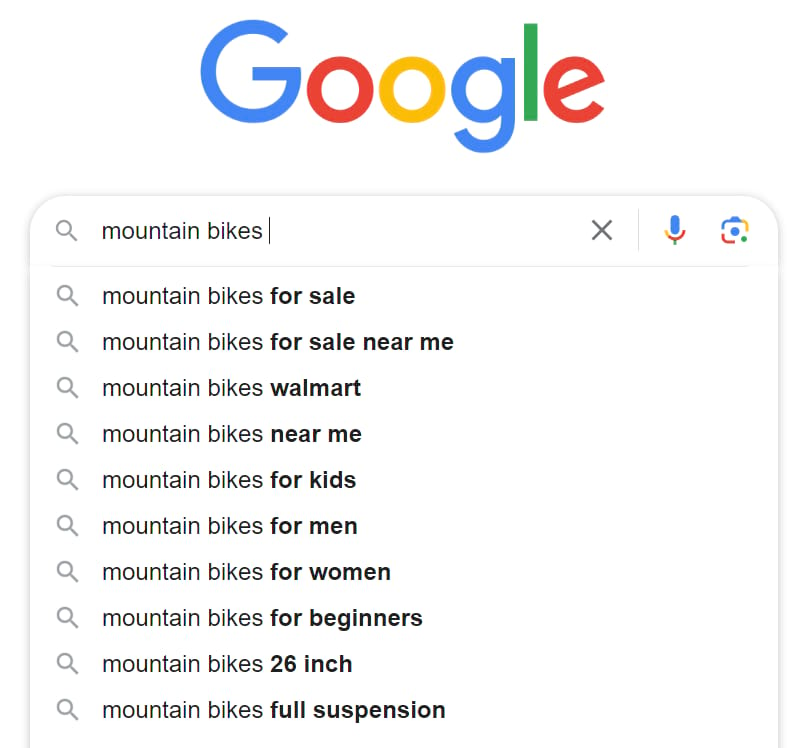
On this instance, you could possibly add “mountain bikes decathlon” and “mountain bikes walmart” to your checklist.
These in all probability received’t be related to skilled mountain bikers.
Add one other letter after your key phrase to see much more strategies:
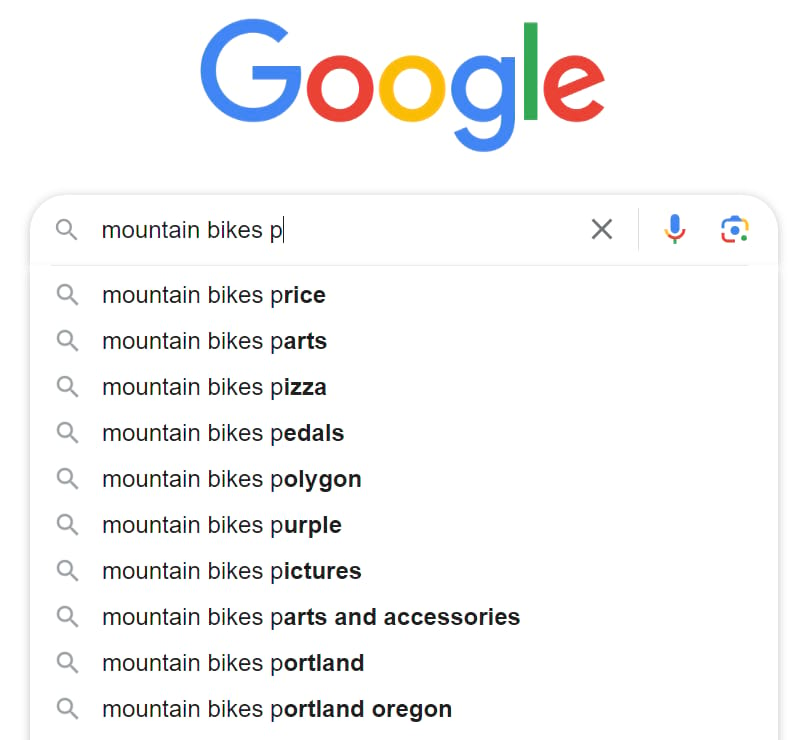
Seek the advice of Google Key phrase Planner
Google Keyword Planner is a free key phrase analysis software for PPC. And it could show you how to discover adverse key phrases.
In the principle menu, click on “Uncover new key phrases.”
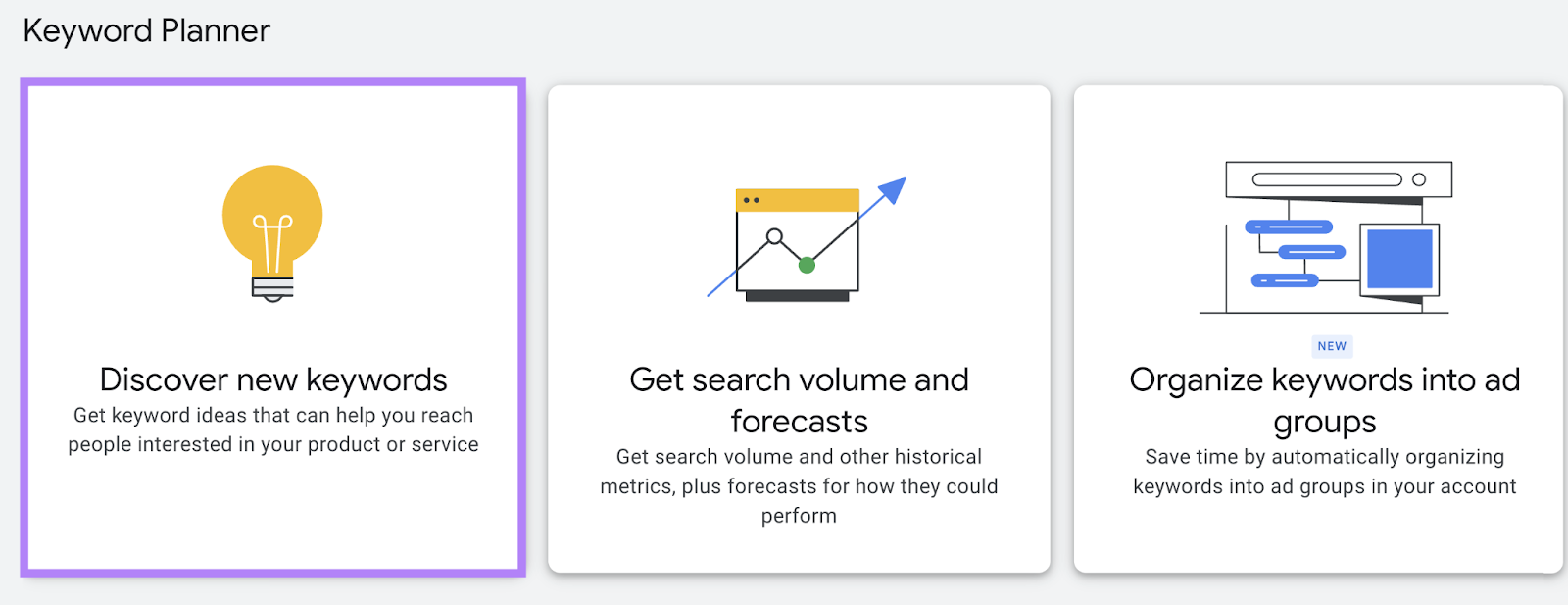
Then, enter your major key phrase and click on “Get outcomes.”
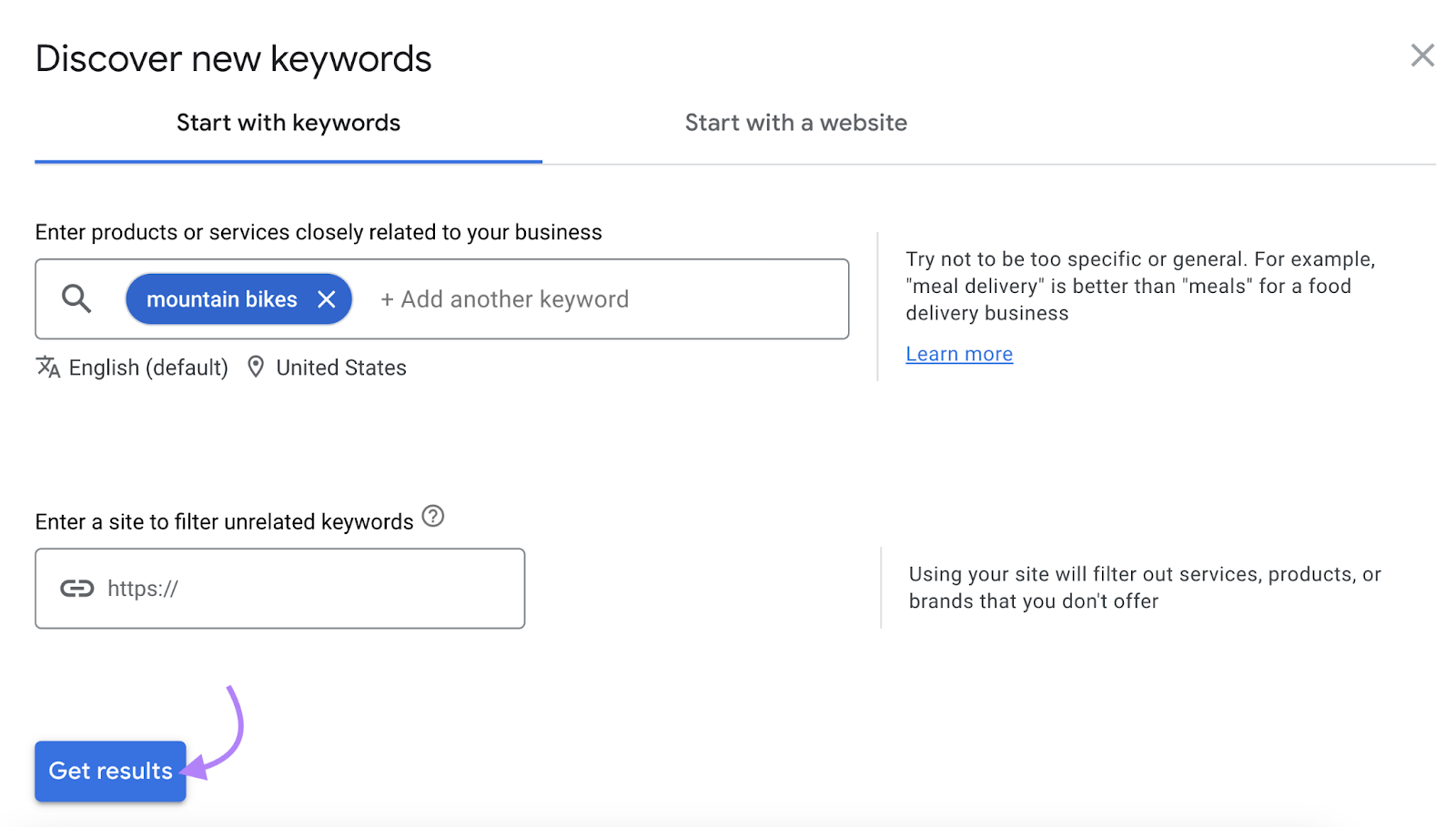
You’ll get a listing of key phrase concepts.
Like so:
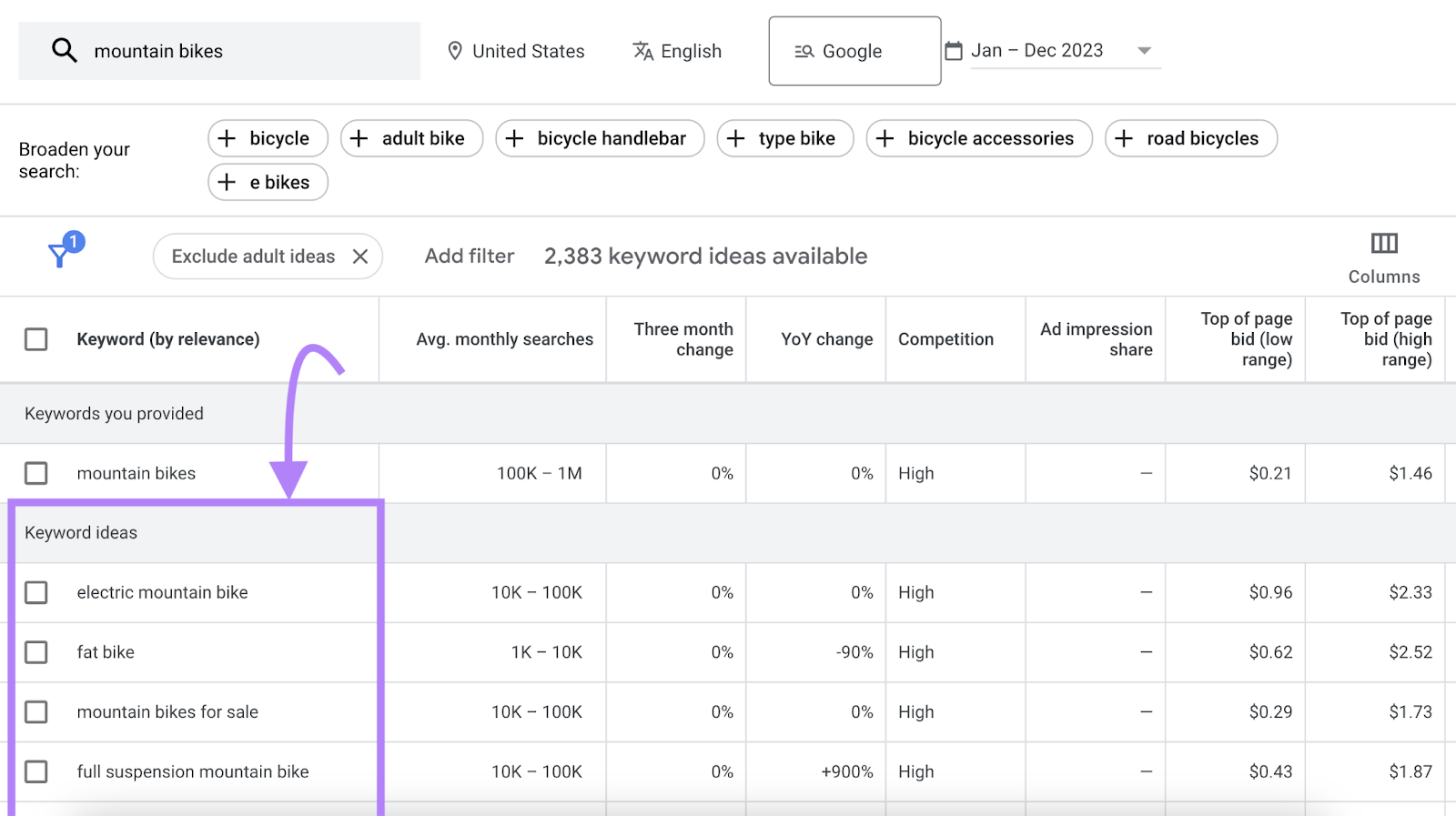
Search for any key phrases which are irrelevant to your marketing campaign and add them to your adverse key phrase checklist.
Additional studying: Google Keyword Planner: How to Use It for SEO and PPC
Analyze the Google Advertisements Search Phrases Report
The Google Advertisements “Search phrases” report reveals a listing of queries folks have used that triggered your advert.
See it in your Google Ads account underneath “Campaigns” > “Insights & reviews” > “Search phrases.”
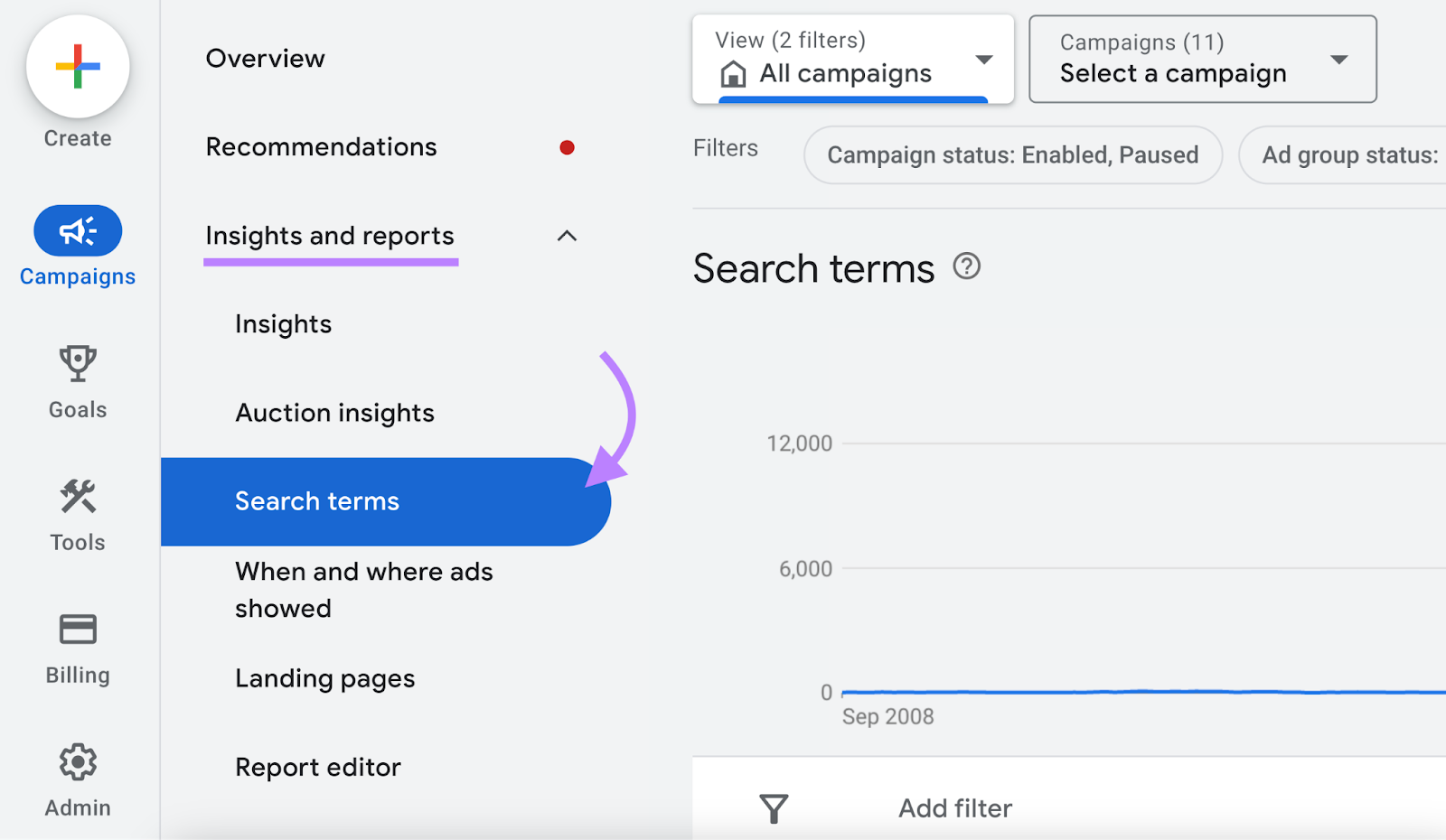
Whereas searching, you could discover search phrases that aren’t related to your marketing campaign.
For instance, on this case, we are able to see “winter canine footwear” and “do canine want footwear.”
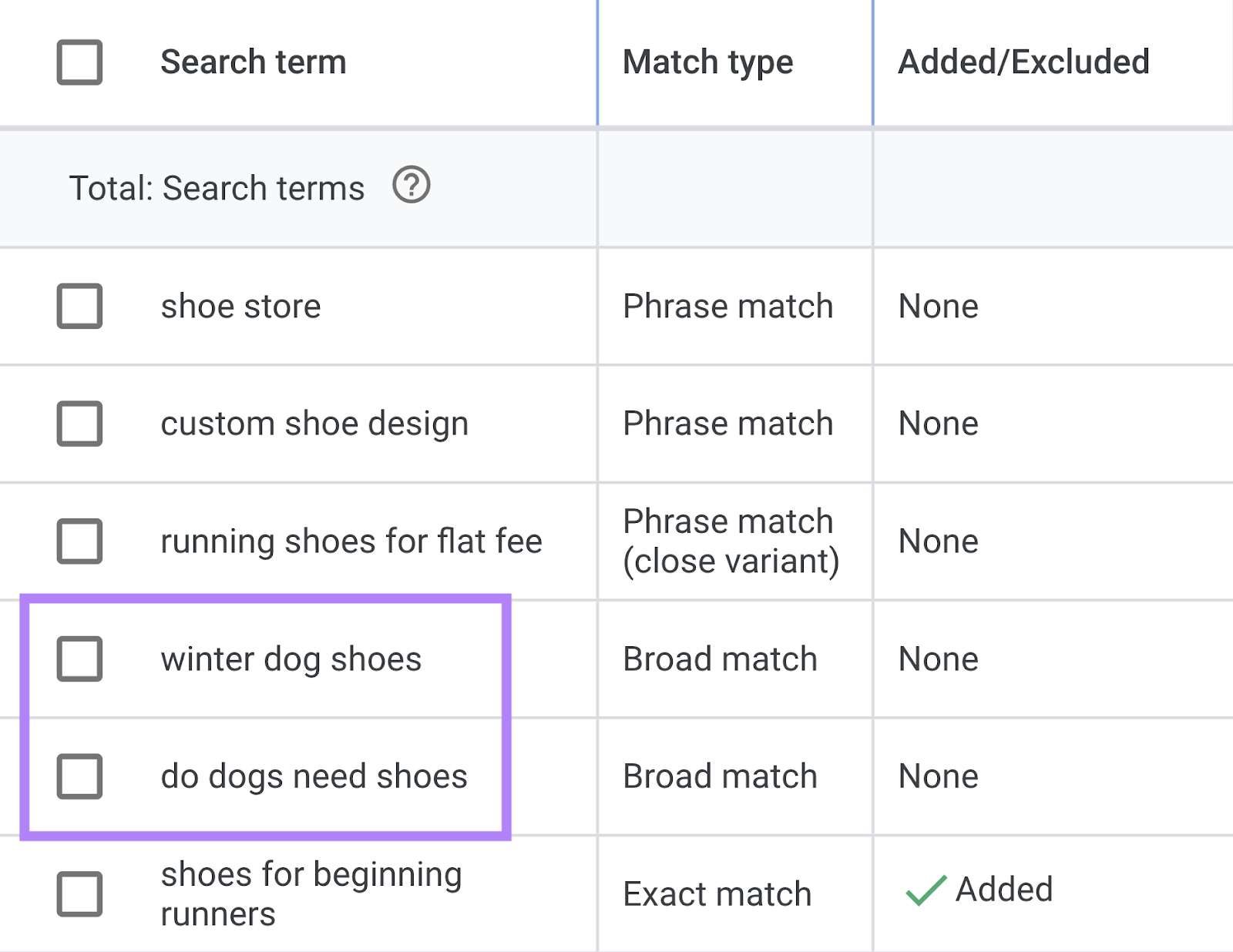
From right here, you’ll be able to add adverse key phrases on to an advert group or marketing campaign, an present adverse key phrase checklist, or a brand new checklist.
Methods to Use Destructive Key phrases in Google Advertisements
After figuring out the adverse key phrases in your campaigns, it is time to add them to your Google Advertisements account.
Right here’s how:
Add Destructive Key phrases from the Search Phrases Report
Out of your “Search phrases” report, examine the packing containers subsequent to the key phrases you’d like so as to add as adverse key phrases.
Then, click on “Add as adverse key phrase.”
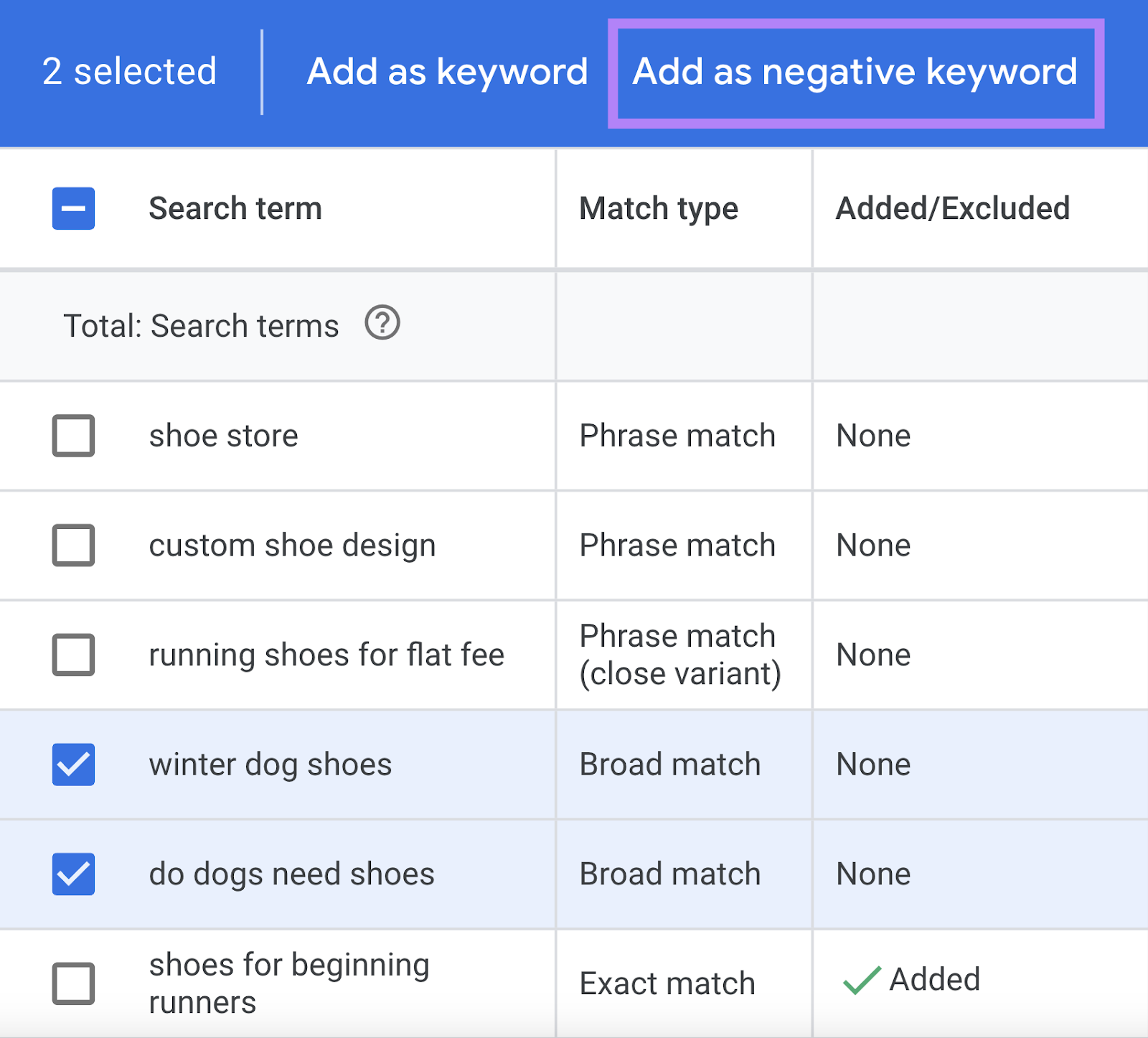
Now you’ll be able to select so as to add the adverse key phrases to an advert group, marketing campaign, new adverse key phrase checklist, or an present checklist.
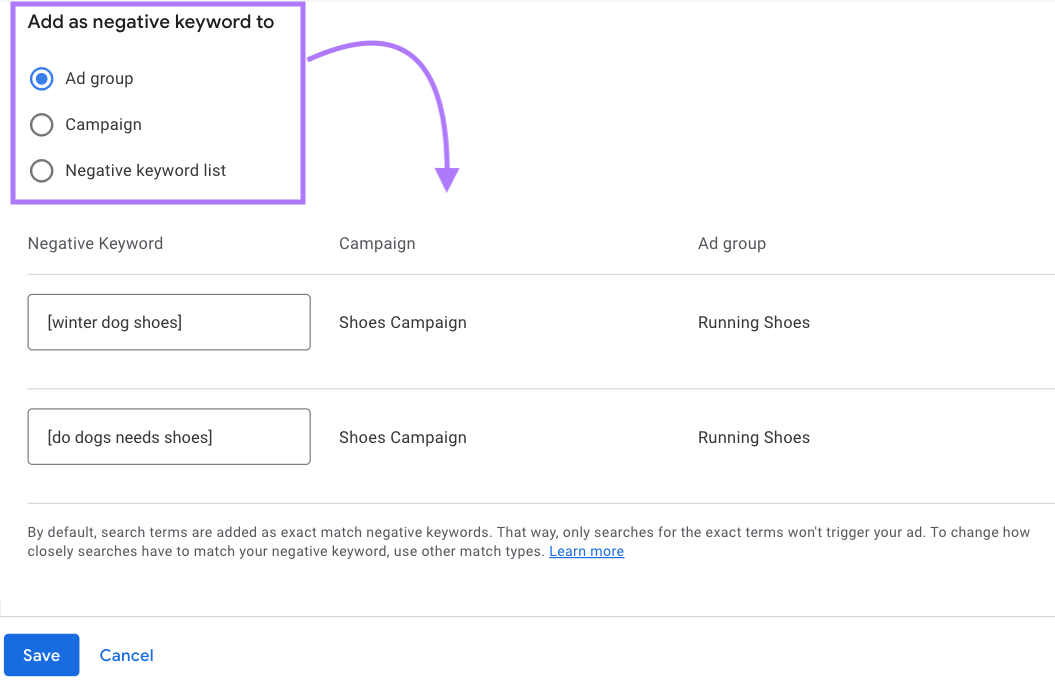
Choose the choice you need, and click on “Save.”
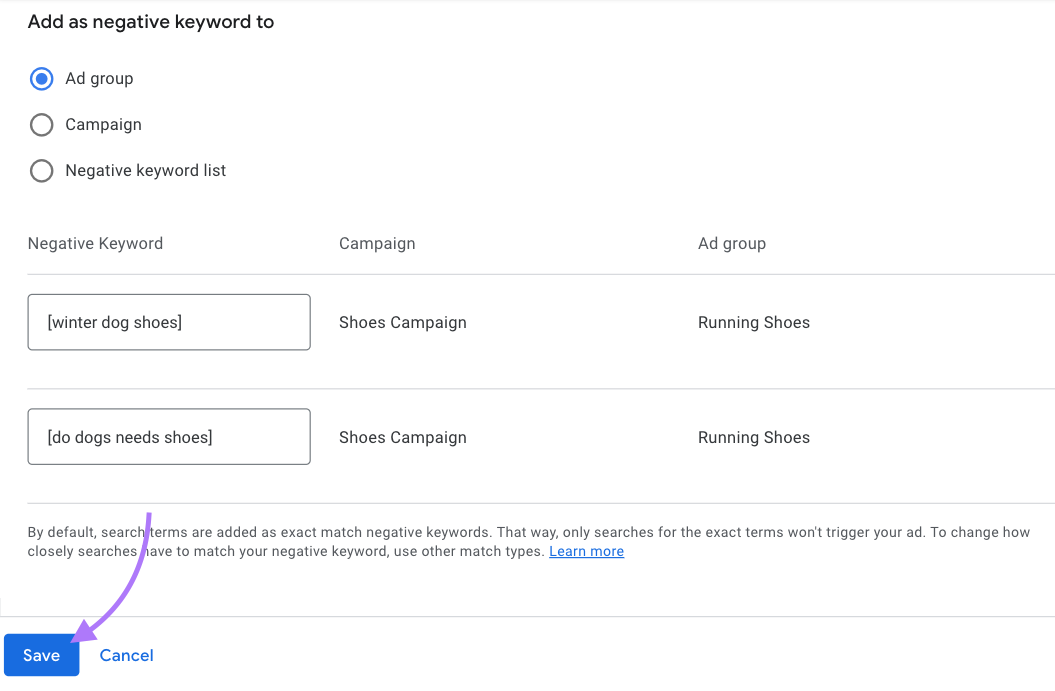
Add Destructive Key phrases from the Dashboard
You may as well create adverse key phrase lists exterior of the “Search phrases” report.
In your Google Advertisements account, click on “Campaigns.”
Then, choose the “Audiences, key phrases, and content material” drop-down within the menu and choose “Destructive search key phrases.”
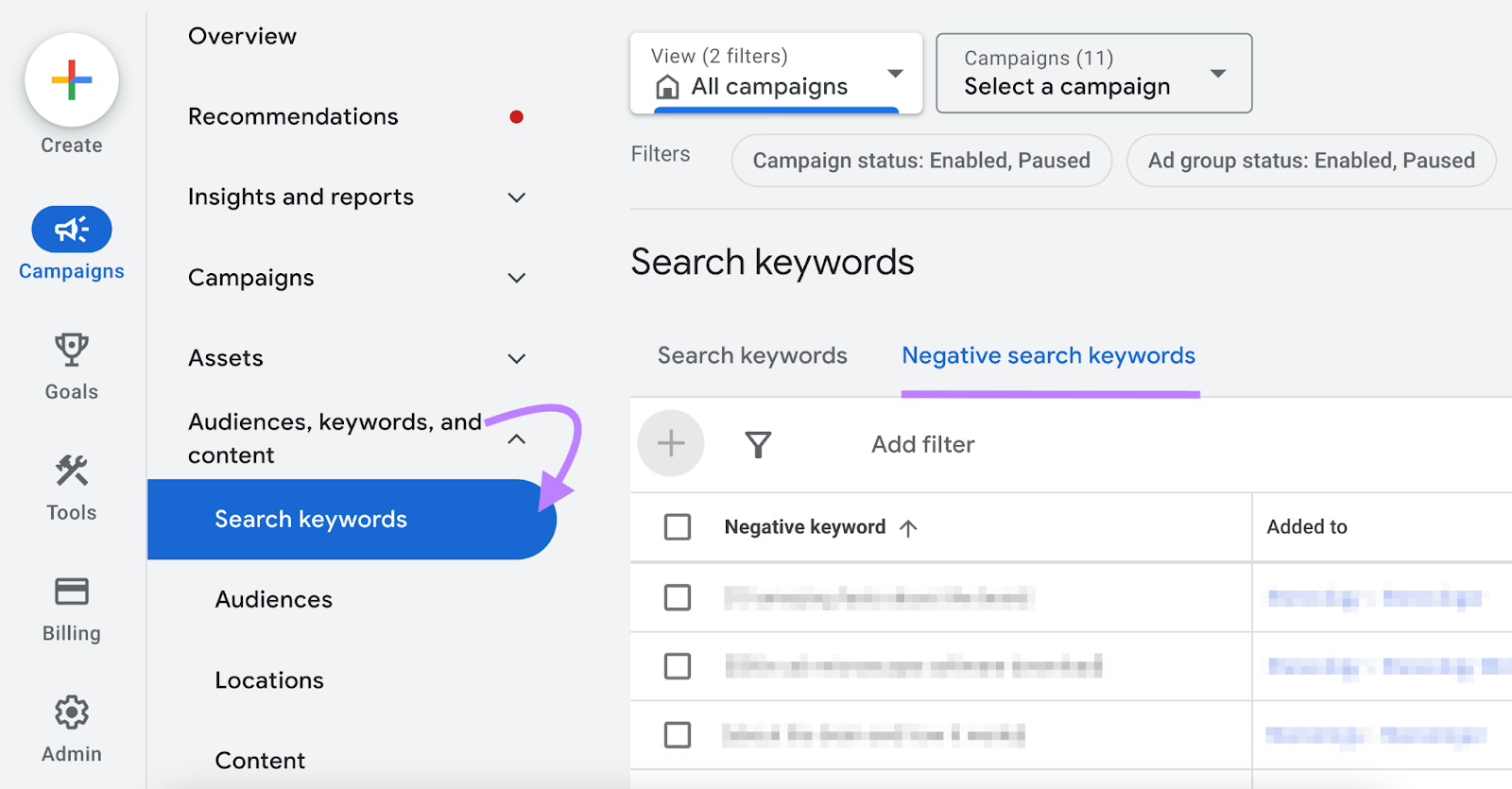
Then, click on the blue plus button.
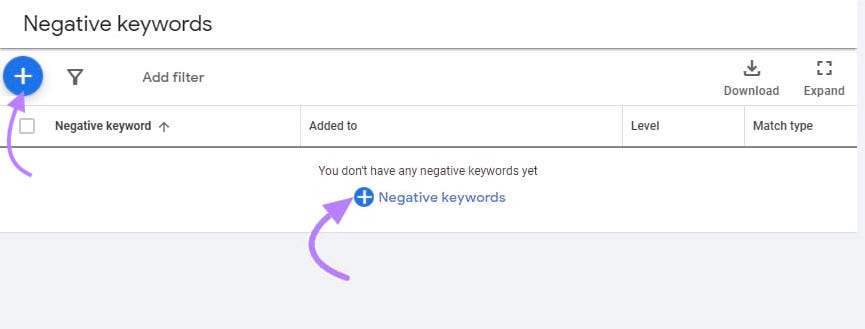
Click on “Choose a marketing campaign” and select the marketing campaign you wish to add the adverse key phrases to.
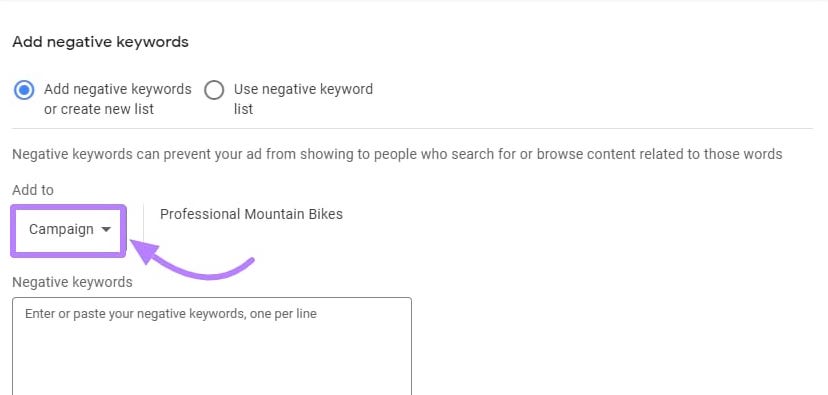
Enter your adverse key phrases. One per line.
You’ll be able to point out the match kind by using these special symbols:
- Nothing for broad match: instance
- Quotations for phrase match: “instance”
- Sq. brackets for precise match: [example]
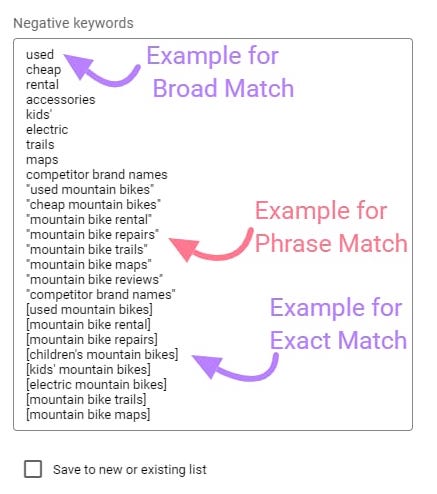
Then, examine “Save to new or present checklist.” And title your new checklist or choose an present checklist.
Lastly, click on “Save.”
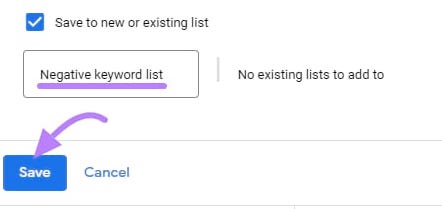
Apply Your Destructive Key phrase Checklist to a Marketing campaign or Advert Group
After creating your adverse key phrase lists, apply them to your campaigns or advert teams.
In your Google Advertisements account dashboard, click on “Campaigns.”
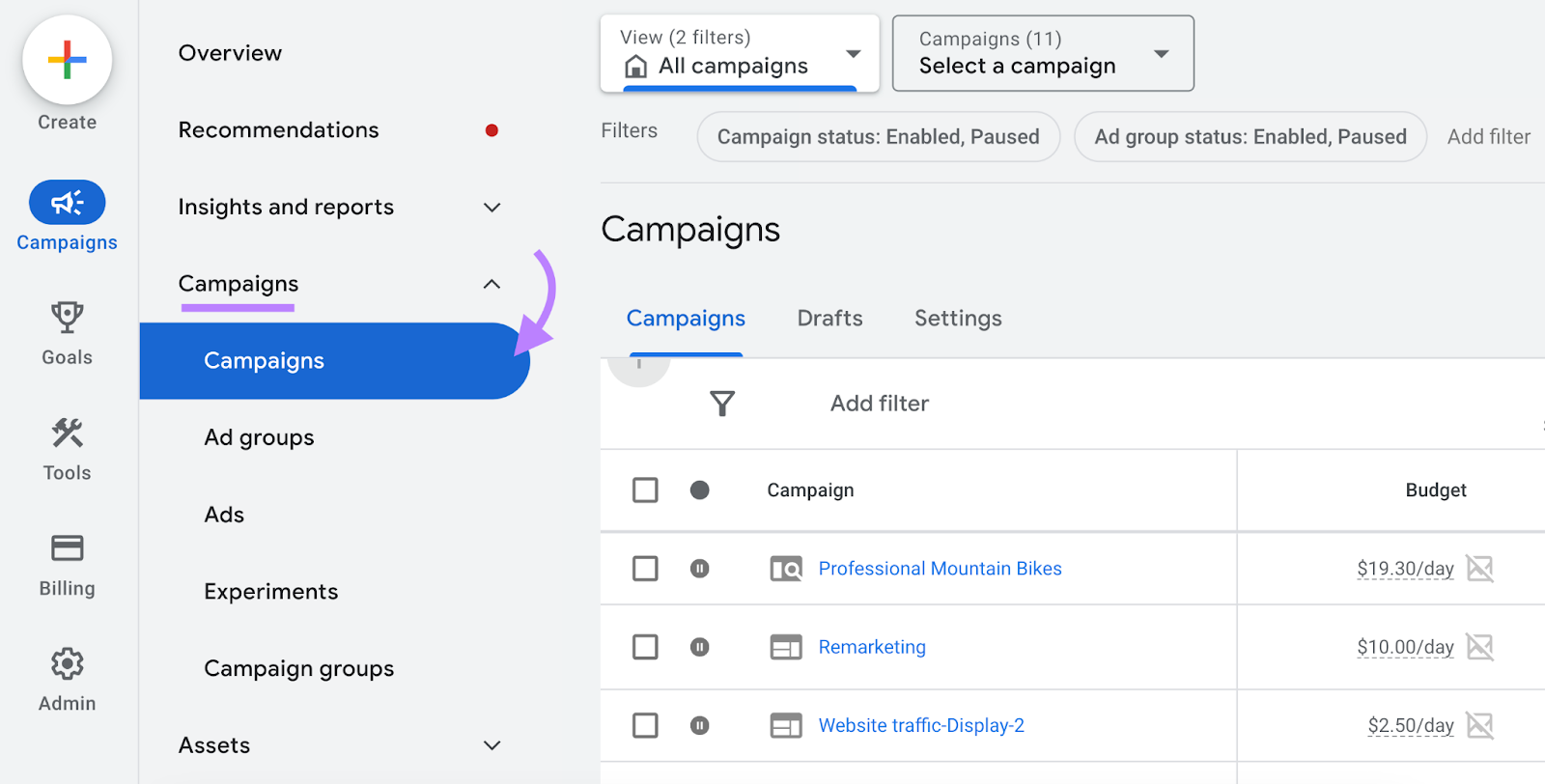
Choose the marketing campaign you wish to add the adverse key phrases to. And click on the “Audiences, key phrases, and content material” drop-down.
Then, click on “Search key phrases.”
Click on on “Destructive Key phrases” on the prime.
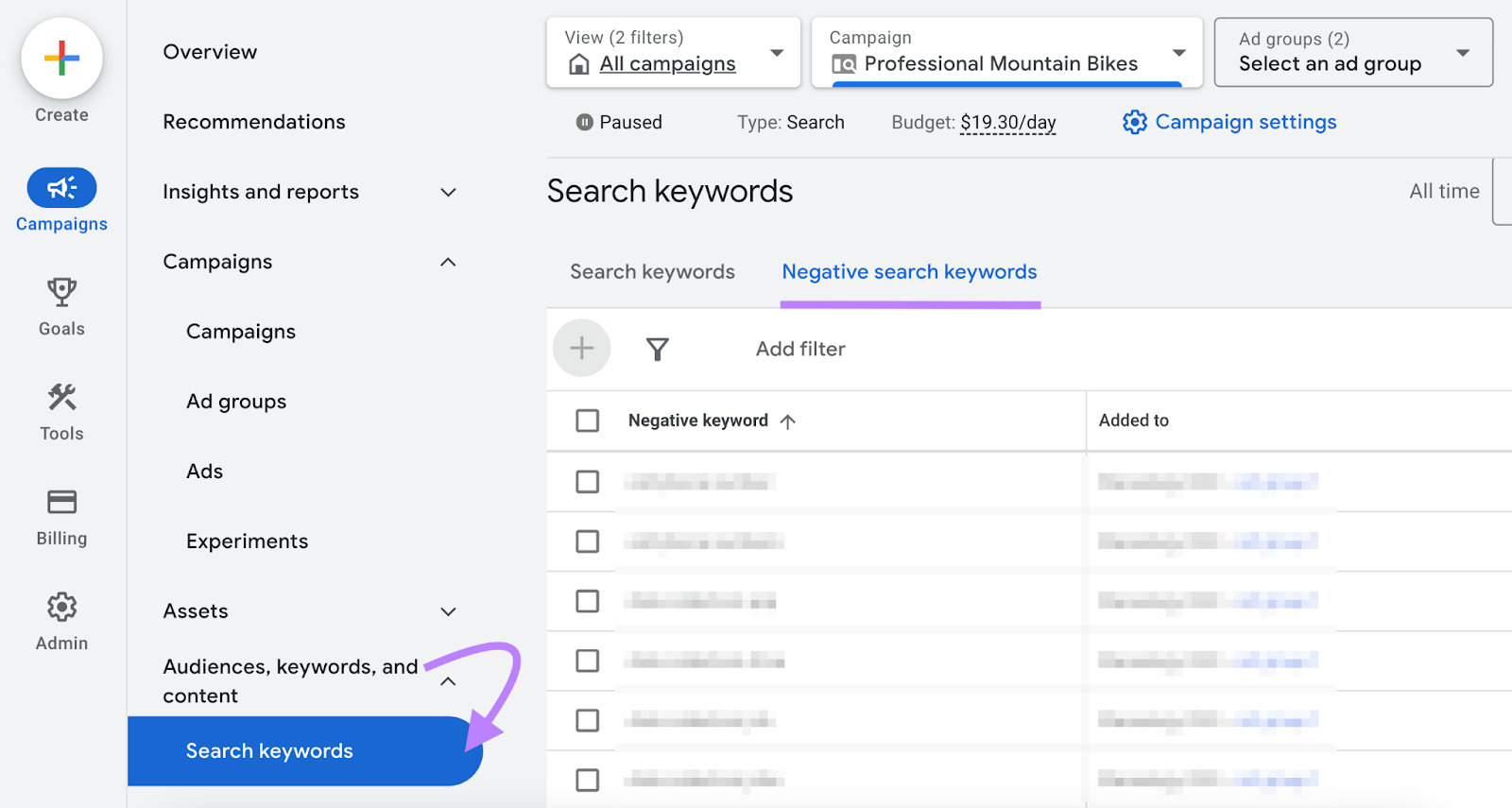
Then, click on the blue plus button and choose “Use adverse key phrase checklist.”
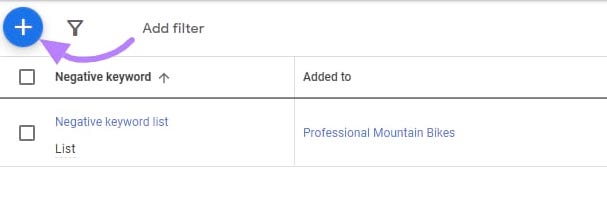
Now, examine the field subsequent to the adverse key phrases checklist you wish to apply to the marketing campaign.
And click on “Save.”
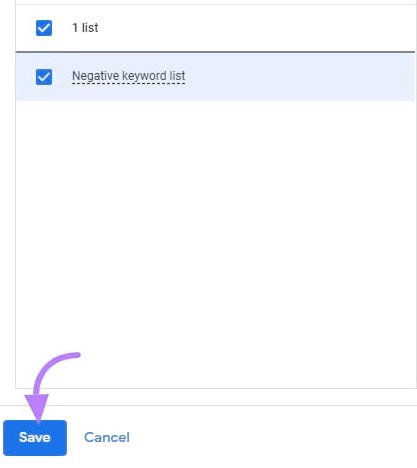
Finest Practices for Destructive Key phrases
To take advantage of your adverse key phrase technique, contemplate the next finest practices:
Add Plural and Singular Key phrases
The extra particular you may be together with your adverse key phrases, the higher focused your advertisements will likely be.
Which means it’s smart so as to add each singular and plural types of key phrases to your checklist. So you’ll be able to keep away from displaying up for searches that embody both model.
For instance, let’s say you don’t wish to rank for “footwear.” You’d additionally wish to add “shoe” to your adverse key phrase checklist.
This straightforward step may help you enhance click-through rate (CTR) and block undesirable site visitors from each singular and plural queries.
Use Symbols with Care
It’s necessary to notice that Google Advertisements solely acknowledges three sorts of symbols in terms of adverse key phrase matching:
- Ampersands: Google does not deal with “&” and “and” the identical. So, you would possibly wish to add each variations of your adverse key phrase (e.g., “Dolce & Gabbana” and “Dolce and Gabbana”).
- Accent marks: Google does not deal with letters with and with out accent marks (e.g., “e” and “é”) the identical. So, you would possibly wish to add each variations of your adverse key phrase (e.g., “René Caovilla” and “Rene Caovilla”).
- Asterisks: Google does not allow you to use “*” as a catch-all added to the top of a sequence of letters to exclude all key phrases that include that particular letter sequence (like “zucc*” to cowl each “zucchini” and the frequent misspelling “zuccini”). So, you need to solely use the image within the very uncommon instances when your goal customers would possibly embody it.
All different symbols are ignored or invalid. So it’s finest to go away them out.
Letter capitalization doesn’t matter, both.
For instance:
- The adverse key phrase “childrens footwear” may even exclude the question “kids’s footwear”
- The adverse key phrase “okay swiss” will exclude additionally the question “Ok-swiss”
- The adverse key phrase “dr martens” may even exclude the question “Dr. Martens”
Experiment with Completely different Match Sorts
You may as well mess around with completely different match sorts in your adverse key phrases.
For instance, you’ll be able to block out any search that features your adverse key phrase with broad match negatives.
Whereas with precise match negatives, you’re in a position to block out the precise time period.
This provides you extra management over which queries set off your advertisements.
Discover and Take away Low-Performing Key phrases
Keep watch over your “Search phrases” reviews and search for key phrases that get a lot of impressions however don’t carry out nicely.
For instance, key phrases which have excessive impressions however low CTRs or low High quality Scores.
You’ll be able to add these as precise match adverse key phrases to spice up these metrics.
This fashion, you can also make probably the most out of your promoting funds.
Repeatedly Monitor and Evaluation
Repeatedly use the search phrases reviews, conversion information, and buyer suggestions to search out new adverse key phrase alternatives (or consider how the present ones are performing).
Conserving your adverse key phrase lists up to date ensures they’re nonetheless related and match your marketing campaign targets.
Preserve Optimizing Your Key phrase Lists
Discovering and including adverse key phrases is necessary. However don’t cease there.
PPC is consistently evolving. Rankings change, opponents change, and algorithms change.
So, you need to control your marketing campaign information and steadily optimize your key phrase lists.
And you are able to do that with the PPC Keyword Tool.
It could possibly show you how to cross-reference key phrases between completely different advert teams, add adverse key phrases you hadn’t thought-about, and seamlessly import all the pieces into Google Advertisements.
Simply import your key phrases, and the software will mechanically counsel suggestions.
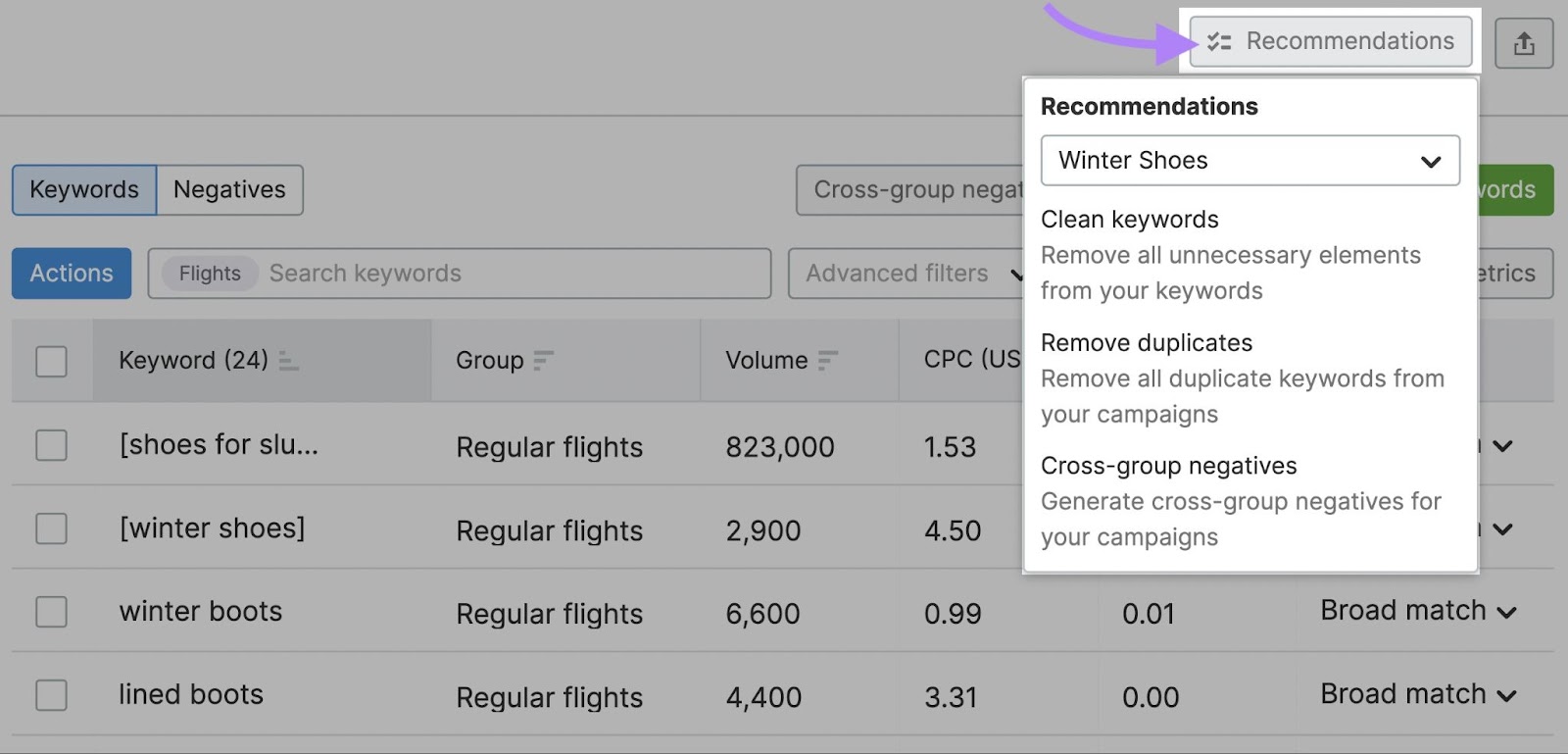
Do that month-to-month or each different week should you’re working a number of campaigns without delay.




